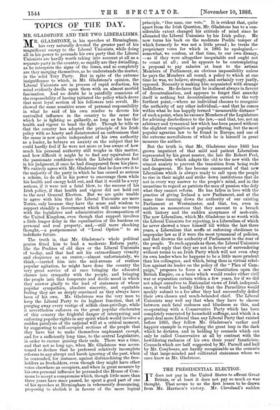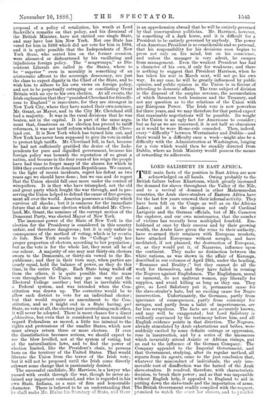THE PRESIDENTIAL ELECTION.
IT does not pay in the United States to affront Great Britain, or at least it does not pay so much as was thought. That seems to us the first lesson to be drawn from Mr. Harrison's victory. Mr. Cleveland's sudden proposal of a policy of retaliation, his wrath at Lord Sackville's remarks on that policy, and his dismissal of the British Minister, have not carried one single State, and may have lost him New York. Not one State has voted for him in 1888 which did not vote for him in 1884, and it is quite possible that the Independents of New York State, who seated him on the former occasion, were alienated or disheartened by his vacillating and injudicious foreign policy. The " mugwumps," as Dis- sentient Liberals are called in the States, where to be " superior " even in morality is something of an aristocratic affront to the sovereign democracy, are just the class to expect dignity in the Chief of the State, and to wish him to adhere to his own views on foreign policy, and not to be perpetually outraging or conciliating Great Britain with an eye to his own election. At all events, the Irish explanation that they "punished Cleveland for friendli- ness to England" is inaccurate, for they are strongest in New York City, where they have seated their own nominee, Mr. Grant, as Mayor, and in the City Mr. Cleveland still had a majority. It was in the rural divisions that he was beaten, not in the capital It is part of the same argu- ment that, disastrous as the election has proved to tariff reformers, it was not tariff reform which turned Mr. Cleve- land out. It is New York which has turned him out, and New York has never been supposed to give its vote in order to protect high tariffs. Mr. Cleveland fell, in fact, because he had not sufficiently gratified the desire of the Inde- pendents for pure and dignified government, because his foreign policy was beneath the reputation of so great a nation, and because in the four years of his reign the people have had time to forget many of the abuses for which in 1884 they overthrew the dominant Republicans. We cannot, in the light of recent incidents, regret his defeat as two years ago we should have done ; but we can and do regret that the Union should fall once more under the control of wirepullers. It is they who have triumphed, not the old and great party which fought the war through, and in pre- serving the Union helped to defend the cause of free govern- ment all over the world. America possesses a vitality which survives all shocks ; but it is ominous for the immediate future that at the same election which defeated Mr. Cleve- land, Mr. Grant, the nominee of the corrupt section of the Democrat Party, was elected Mayor of New York.
The immense power of the State of New York in the election for the Presidency is considered in this country unfair, and therefore dangerous ; but it is only unfair in consequence of the method of voting, which is by serutin de lists. New York sends to the " College " only her proper proportion of electors, according to her population ; but as the vote is for the whole list, they must all be of one colour. A majority of one may seat thirty-six electors sworn to the Democrats, or thirty-six vowed to the Re- publicans ; and they in their turn may, when parties are nearly equal, hold the balance of power, as they do this time, in the entire College. Each State being walled off from the others, it is quite possible that the mass vote throughout the Union may go one way and the Electoral College another ; but that is inevitable with a Federal system, and was intended when the Con- stitution was drawn up. The corrective would be to allow each district to vote for an individual elector ; but that would require an amendment to the Con- stitution, and as it might end in a State having, quet State, no vote at all, the electors just neutralising each other, it will never be adopted. There is more chance for a direct plebiseitinn, but even that is considered by men trained to regard Federalism as sacred, a little too inimical to the rights and pretensions of the smaller States, which now must always return three or more electors. If ever the dissatisfaction becomes serious, we should expect to see the blow levelled, not at the system of voting, but at the naturalisation laws, and to find the power of election limited, like the President's chair, to persons born on the territory of the United States. That would liberate the Union from the terror of the Irish vote ; but it will not be proposed until the Irish come directly athwart some change that is passionately desired.
The successful candidate, Mr. Harrison, is a lawyer who passed with credit through the war, though he never at- tained any important command, and who is regarded in his own State, Indiana, as a man of firm and honourable character. There is believed to be an understanding that he shall make Mr. Blaine his Secretary of State, and there is an apprehension abroad that he will be entirely governed by that unscrupulous politician. Mr. Harrison, however, is something of a dark horse, and it is difficult for a President to be entirely governed by anybody. The power of an American President is so considerable and. so personal, that his responsibility for his decisions soon begins to press not only on his mind, but on his conscience, and unless the manager is very adroit, he escapes from management. Even the weakest President has had a character of his own, if only for weakness ; and there is nothing to suggest that President Harrison, when he has taken his seat in March next, will not go his own way. In any case, he will be greatly influenced by public opinion, and public opinion in the Union is in favour of attending to domestic affairs. The true subject of division is the disposal of the surplus revenue, the accumulation of which threatens both business and the Treasury, and not any question as to the relations of the Union with any European Power. The Irish vote is now powerless for three years, and we may therefore for that period expect that reasonable negotiations will be possible. Its weight in the Union is an ugly fact for Americans to consider ; but as far as we are concerned, it is not half so obnoxious as it would be were Home-rule conceded. Then, indeed, every " difficulty " between Westminster and Dublin—and there would be a difficulty once a week—might also be a difficulty with the Administration at Washington, longing for a vote which would then be steadily directed from Dublin, where an Irish Ministry would possess the means of rewarding its adherents.







































 Previous page
Previous page